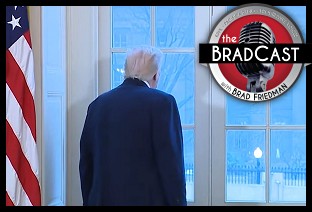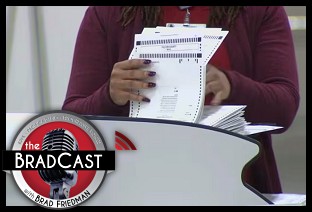READER COMMENTS ON
"CNN's Lou Dobbs: An Electronic Voting Machine Debacle In Ohio's 2006 Primary Election"
(16 Responses so far...)
COMMENT #1 [Permalink]
...
Dredd
said on 8/16/2006 @ 7:09 pm PT...
I watched too John.
I could not help but appreciate the stick-to-it attitude of the Dobbs show.
Of course an 18 wheeler can never out manouvre a jaguar ... anyway ... blogs have their part and Lou does too.
COMMENT #2 [Permalink]
...
plunger
said on 8/17/2006 @ 1:11 am PT...
Tell everyone on every blog.
Freedom of the press is under attack - literally!
One of America's TOP investigative journalists was attacked by Homeland Security Goons:
Cops Arrest AFP Journalist Christopher Bollyn
Kurt Nimmo
August 16, 2006
"I was harassed, beaten, and shocked with a Tazer-like gun in my front yard before my wife and children, and then abused for 6 hours by the ADL-trained local police," explains American Free Press journalist and Republic Broadcast Network talk show host Christopher Bollyn on the RBN website. "I have every reason to believe it is because of my journalistic investigation into 9/11. I have been threatened before in my career as a journalist, but this is the first time I have been intentionally beaten and abused—by the cops…. I intend to seek asylum in Norway or Switzerland. I can read the writing on the wall."
Indeed, the writing is on the wall. In the neocon "you’re either with us or with the terrorists" political climate in America today, those who tell the truth are increasingly coming under the gun—or as in Bollyn’s case, under a Tazer. It is a short step from accusations of treason and appeasement of terrorists, who work for the government—or are simply retarded patsies set-up to take a fall—and the sort of violence practiced by the Nazis and their goons after Hitler pulled off his Gesetz zur Behebung der Not von Volk und Reich, or the Law to Remedy the Distress of the People and the Reich. Bush has come a long way in realizing his Ermächtigungsgesetz, or Enabling Act, and it won’t be long now before minor complaints are dealt with in severe fashion, as they always are under fascist dictatorships.
"And the administration has not only the right, but the duty, in my opinion, to pursue fifth column movements," Senator Lindsey Graham told AG Gonzales earlier this year. "And let me tell folks who are watching what a fifth column movement is. It is a movement known to every war where American citizens will sympathize with the enemy and collaborate with the enemy. And it’s happened in every war…. and I don’t think you need a warrant to do that."
According to the Manichean dictum of the neocons—you’re with us in the forever war against the Muslims, or you’re with the terrorists—revealing certain facts, as Bollyn has done over the years, may result in, for now, arrest and abuse. However, next month or next year, certainly after the next staged terror attack, it will result in far harsher, even fatal retaliation, as it invariably does in fascist countries.
http://www.uruknet.info/...;l=i&size=1&hd=0
http://www.rumormillnews....cgi?noframes;read=91920
GOT FASCISM?
GOT FASCISM?
GOT FASCISM?
COMMENT #3 [Permalink]
...
Larry Bergan
said on 8/17/2006 @ 3:40 am PT...
You are feeling very sleepy. Listen to the sound of my voice:
"The machines work. There is nothing wrong with the machines."
"The machines work. There is nothing wrong with the machines."
When I click my fingers, you will wake up feeling better then you have ever felt in your life!
COMMENT #4 [Permalink]
...
oldturk
said on 8/17/2006 @ 4:52 am PT...
Comment # 2,..
I feel very,.. very ill.
COMMENT #5 [Permalink]
...
BOB YOUNG
said on 8/17/2006 @ 5:58 am PT...
"That is not what the report concludes."The current election system, if left unchanged, contains significant threats. One likely result is diminished public confidence in a close election."
There should not be diminished confidence in only close elections but all other ”elections” as well. With these easily manipulated machines in use there is no need to “win” by a small margin. Criminals already claim that the 2004 presidential election could not have been stolen because of the margin of Dubya’s “victory”. Unfortunately fraud was responsible for all of his margin of “victory”, and so much more. Elections are not all stolen 51 to 49 anymore. The machines make it so easy to shift votes that there is no need to win by a small margin. Small margins draw unnecessary attention. Not wanting a repeat of the controversy in the 2000 election again in 2004 the experienced stupid Criminals who stole the 2000 “election” stole the 2004 “election” by a wider margin.
Although there are 1366 precincts in Ohio of which 49 had exit polls the footprints of fraud I linked to at that link show huge swings of votes from Kerry to Bush in about 1/3 of the 49 precincts that conducted exit polls. Any criminal with good judgment should know enough not to steal where somebody is watching. The stupid criminals who stole Ohio for Bush in 2004 clearly did not use good judgment. My link to the footprints of fraud in that NEDA report could not exist if the criminals who committed the fraud had the good judgment to steal votes in just the 1317 of the 1366 Ohio precincts that had no exit polls. Those criminals were not that clever. They stole votes everywhere they got the chance!
Writing off the errors as the fault of poll workers is just a smoke screen. That sure was not the cause of the problems in the 2004 presidential election. Ohio rotates positions on the ballots from precinct to precinct. That rotation should have made the probability of any of the vote shifting in the state, going toward Kerry or Bush, almost exactly a 50-50 proposition. All vote shifts reported went to Bush. The odds of n straight vote shifts going to Bush from Kerry would be 1 in 2 raised to the power of n. The vote shifting in the 2004 presidential election was clearly not a 50-50 proposition. Clearly the vote shifting errors that happened in the Ohio Presidential ”election” did not happen by chance. Those “errors” happened by design. Vote switching by design is FRAUD! The 2004 Presidential ”election” in Ohio was clearly a FRAUDULENT “election”. The EVM’s clearly took part in that fraud! The laws of probability tell us beyond the shadow of a doubt that those machines absolutely had to be in on that HUGE “election” heist!
COMMENT #6 [Permalink]
...
Winter Patriot
said on 8/17/2006 @ 7:39 am PT...
PILGRIM: The county board of elections says they need to get to the bottom of this. They want the authors of the report, the scientists to sit down with Diebold and agree on what went wrong. They will then take measures to fix the problems.
If the county board of elections won't act to fix the problems until the authors of the report and Diebold agree on what went wrong ... well, I wouldn't want to see anybody hold their breath.
Pilgrim again:
And the scientists welcome that opportunity.
I'm sure Diebold does too.
COMMENT #7 [Permalink]
...
Phyllis Huster
said on 8/17/2006 @ 9:51 am PT...
There's NO FIXING the problems. In Georgia, the 2002 Punch List of Diebold bugs has still not been fixed. The mismatch with ballots, election summaries, memory cards and official reports was outlined with evidence of official Georgia data and has been online since 2005 on www.countpaperballots.com. Hertzberg, finally, is not saying "the machines are ok" but got paid $340K to finally tell the truth, the machines are NOT OK, will never be OK. SO this begs the question, why not put paper trial printers on the damn machines... my question to the entire election community (read carefully votetrust USA) is when we have a printer to print the garbage the machine is capturing, and we do a recount, finding , WOOPS that the paper ballot totals and the machine totals surprise, surprise don't match, why would we give Diebold another X$ Millions of dollar for paper trail printing technology adds ons, rather than sue Diebold for 3X the cost of the damn machines and go back to THE MOST RELIABLE FORM OF ELECTRONIC VOTING .. the sheet of paper and pencil.
For the people that say counting paper takes too long, tell that to the 180+ Countries in the world that still use paper ballots for voting including Ireland that spent 40M Euros on electronic equipment and went back to paper. No, I daresay, this is more than 'we need a better computer solution'. This is get the computer out of the loop between the voter and the ballot box.
simplify simpify simplify.....
finally, ESI found it's voice after months and years of struggling in the dark.. .welcome to the bright side Steven....we've missed you....
COMMENT #8 [Permalink]
...
Phyllis Huster
said on 8/17/2006 @ 9:55 am PT...
one more thing.. why not make it mandatory citizen participation on election day like jury duty.. every so few years, you are required to be a pollworker, or a ballot counter or whatever....
it's time the american people step up to their civic duty and value the power and responsibility of their right to vote....
for the folks that this presents a hardship, we make it a paid holiday like christmas...
COMMENT #9 [Permalink]
...
jen
said on 8/17/2006 @ 2:11 pm PT...
Mark Crispin Miller has a dire prediction for the November election. It explains perfectly why Corporate Press is now willing to report on E-Vote Fraud.
ms in la interviewed him (and David Dill and CA Senator Debra Bowen) for this week's 'ClarkCast' --- but due to time constraints the entire interview isn't included in the podcast (Part 2 comes out next week).
ms has the transcript of the interview with MCM, with his "prediction" on her blog at CCN. We've gotta be ready for this one...
COMMENT #10 [Permalink]
...
Arry
said on 8/17/2006 @ 6:22 pm PT...
I'm a little unclear on how the Republicans would work the election fraud issue. (from the Crispin interview) Certainly they couldn't look closely at unverifiable "results". They couldn't demand legitimate recounts (or counts). They couldn't demand to look at proprietary software.
Would it be the old shell trick again? Trumped up hysteria that Democrats stole the elections and leave it at that so that people are fixated on that particular empty shell?
COMMENT #11 [Permalink]
...
Grizzly Bear Dancer
said on 8/17/2006 @ 6:53 pm PT...
Comment #7 excellent points. Blackwell knows the way he manipulated the 2004 election and faux recount for Bush and this sits fine with him. This piece of shit belongs in PRISON for his crimes against American voters but no criminal charges pending. Instead he's in line to be the next guvornnnnorrr currently playing the role of Captain Diebold.
The way Blackwell is involved in purging voting rolls in his own election and adding voting requirements to mainly anyone who would vote against this mo fo could only be allowed upon discovery in Bushit criminal Amerikkka. His stock answer on this subject is, "it ain't the electronic voting machines it's those unsophisticated untrained poll workers." As Secretary of State and former co-chair of the Bush/Cheney reelection campaign in Ohio, he promised a Bush victory on these diebold machines. Guess what people, no problems. Bush won!!!
In fact only terrorists would support the proposition that these machines are faulty. To quote the #1 torture advocate on the Bushit administration fascist legal team, Attorney General Alberto Gonzalez (no relation to Speedy), "TERRORISTS ARE IN YOUr NEIGHBORHOOD."
Today Americans across the country thank you for acknowledging your own presence in OUR GOVERNMENT.
COMMENT #12 [Permalink]
...
Darrell Shahan
said on 8/17/2006 @ 10:32 pm PT...
Blackwell says the voting machines in Ohio meet the highest security standards. I would like to know what standards he is speaking about. A lot of the Ohio machines are Diebold touch-screen machines.
A computer science professor said if Diebold had tried to design a machine to be as easily hacked as possible this would be it.
COMMENT #13 [Permalink]
...
Jerry O\\\'Riordan
said on 8/17/2006 @ 11:09 pm PT...
You are feeling extremely sleepy! Listen to the sound of my voice!
The republicans stole Ohio in 2004.
The republicans stole Florida in 2000.
The republicans love to steal elections!
You are feeling like listening to Air America!
You are feeling like listening to Randi Rhodes!
You are feeling like questioning Ohio!
You are feeling like asking what the fuck took place in the Buckeye State in 2004!
You are feeling like questioning authority!
You are feeling like authorizing questions!
You are feeling like administering the Chinese water torture to Secretary of State John Kenneth Blackwell!
COMMENT #14 [Permalink]
...
freaktown
said on 8/18/2006 @ 10:08 am PT...
The Secretary of State in Ohio is also running for Governor.
Maybe that's why he thinks the machines work. Not only does he get to "fix" the election with machines that don't register votes, but he also gets the job (due to his status as SOS) of certifying the vote and making the outcome official.
This could be a Katherine Harris moment all over again if everything goes wrong.
Ted Strickland is leading in the polls against Blackwell, which means the conditions are ripe for another stolen election.
"It's not who votes that counts, but who counts the votes."
COMMENT #15 [Permalink]
...
gord
said on 8/18/2006 @ 11:19 am PT...
I think a very serious issue related to the security issues in Diebold's voting machines is the security of Diebold automatic banking machines.
These voting machines have widespread and persistent software glitches, serious security problems, lack of documentation and training and Diebold response to problems.
If these serious shortcomings are any indication, then every financial institution and person using Diebold ATMs should be very very concerned.
Call your financial institution today to voice your concern.
Your money and financial future may be at risk if the Diebold security problems extend into their ATMs.
COMMENT #16 [Permalink]
...
what now toons
said on 8/18/2006 @ 6:39 pm PT...
I'm doing everything I can to make people think about these machines. I devoted a few of my cartoons to this subject. Here's a link to one of them
http://www.whatnowtoons.com/#034
 Tonight Lou revisits the world of electronic voting in Ohio, where the evidence points to voting machine problems, but the vendors, especially Diebold, and the state want everyone to believe that the poll and election workers are just too dumb to do the work and all of the problems are their fault. For more on this story see the recent BRAD BLOG article regarding the Cuyahoga County investigation.
Tonight Lou revisits the world of electronic voting in Ohio, where the evidence points to voting machine problems, but the vendors, especially Diebold, and the state want everyone to believe that the poll and election workers are just too dumb to do the work and all of the problems are their fault. For more on this story see the recent BRAD BLOG article regarding the Cuyahoga County investigation.


 It's About Elections and the Windmills of His Mind: 'BradCast' 1/29/26
It's About Elections and the Windmills of His Mind: 'BradCast' 1/29/26 'Green News Report' 1/29/26
'Green News Report' 1/29/26
 Govt Shutdown Over ICE Funding Near Certain This Weekend: 'BradCast' 1/28/26
Govt Shutdown Over ICE Funding Near Certain This Weekend: 'BradCast' 1/28/26 Trump Blinks, Bovino Out, MN Op Falters but Continues as Midterm Accountability Looms: 'BradCast' 1/27/26
Trump Blinks, Bovino Out, MN Op Falters but Continues as Midterm Accountability Looms: 'BradCast' 1/27/26 'Green News Report' 1/27/26
'Green News Report' 1/27/26 The ICE Murder of ICU Nurse Alex Pretti and the Heroes of Minneapolis: 'BradCast' 1/26/26
The ICE Murder of ICU Nurse Alex Pretti and the Heroes of Minneapolis: 'BradCast' 1/26/26  The BRAD BLOG: 22 Years and Still Counting
The BRAD BLOG: 22 Years and Still Counting Sunday 'Worth a Thousand Words' Toons
Sunday 'Worth a Thousand Words' Toons Mr. Smith Testifies (Publicly) in Washington: 'BradCast' 1/22/26
Mr. Smith Testifies (Publicly) in Washington: 'BradCast' 1/22/26 'Green News Report' 1/22/26
'Green News Report' 1/22/26 World Turning Against Self-Destructing U.S. Under Trump: 'BradCast' 1/21/26
World Turning Against Self-Destructing U.S. Under Trump: 'BradCast' 1/21/26 Trump Admin Waste, Fraud, Abuse on Voting, at DOJ, by DOGE: 'BradCast' 1/20/26
Trump Admin Waste, Fraud, Abuse on Voting, at DOJ, by DOGE: 'BradCast' 1/20/26 'Green News Report' 1/20/26
'Green News Report' 1/20/26 Sunday 'Domestic Terrorist' Toons
Sunday 'Domestic Terrorist' Toons 'Green News Report' 1/15/26
'Green News Report' 1/15/26 'A Cornered Rat': Trump Terrorizes Minneapolis, Menaces NATO, World: 'BradCast' 1/15/26
'A Cornered Rat': Trump Terrorizes Minneapolis, Menaces NATO, World: 'BradCast' 1/15/26 'Not Close to Over': Mad King Trump in Venezuela (& Beyond): 'BradCast' 1/14
'Not Close to Over': Mad King Trump in Venezuela (& Beyond): 'BradCast' 1/14 Things Getting Weirder as Trump Keeps Losing: 'BradCast' 1/13/26
Things Getting Weirder as Trump Keeps Losing: 'BradCast' 1/13/26 After ICE Murder in MN, Local Cops Disown Fed Policing Practices: 'BradCast' 1/12/26
After ICE Murder in MN, Local Cops Disown Fed Policing Practices: 'BradCast' 1/12/26 Trump to Congress, Climate, U.N., Rule of Law: DROP DEAD - 'BradCast' 1/8/26
Trump to Congress, Climate, U.N., Rule of Law: DROP DEAD - 'BradCast' 1/8/26 'Nonsense': Trumpers Claim 315k Fraudulent GA Votes in 2020: 'BradCast' 1/7/26
'Nonsense': Trumpers Claim 315k Fraudulent GA Votes in 2020: 'BradCast' 1/7/26 Jack Smith Testimony on Trump J6 Crimes, DOJ Weaponization: 'BradCast' 1/6/26
Jack Smith Testimony on Trump J6 Crimes, DOJ Weaponization: 'BradCast' 1/6/26 Trump War on Venez. is About Ego, Power, 'Alien Enemies Act': 'BradCast' 1/5/26
Trump War on Venez. is About Ego, Power, 'Alien Enemies Act': 'BradCast' 1/5/26
 VA GOP VOTER REG FRAUDSTER OFF HOOK
VA GOP VOTER REG FRAUDSTER OFF HOOK Criminal GOP Voter Registration Fraud Probe Expanding in VA
Criminal GOP Voter Registration Fraud Probe Expanding in VA DOJ PROBE SOUGHT AFTER VA ARREST
DOJ PROBE SOUGHT AFTER VA ARREST Arrest in VA: GOP Voter Reg Scandal Widens
Arrest in VA: GOP Voter Reg Scandal Widens ALL TOGETHER: ROVE, SPROUL, KOCHS, RNC
ALL TOGETHER: ROVE, SPROUL, KOCHS, RNC LATimes: RNC's 'Fired' Sproul Working for Repubs in 'as Many as 30 States'
LATimes: RNC's 'Fired' Sproul Working for Repubs in 'as Many as 30 States' 'Fired' Sproul Group 'Cloned', Still Working for Republicans in At Least 10 States
'Fired' Sproul Group 'Cloned', Still Working for Republicans in At Least 10 States FINALLY: FOX ON GOP REG FRAUD SCANDAL
FINALLY: FOX ON GOP REG FRAUD SCANDAL COLORADO FOLLOWS FLORIDA WITH GOP CRIMINAL INVESTIGATION
COLORADO FOLLOWS FLORIDA WITH GOP CRIMINAL INVESTIGATION CRIMINAL PROBE LAUNCHED INTO GOP VOTER REGISTRATION FRAUD SCANDAL IN FL
CRIMINAL PROBE LAUNCHED INTO GOP VOTER REGISTRATION FRAUD SCANDAL IN FL Brad Breaks PA Photo ID & GOP Registration Fraud Scandal News on Hartmann TV
Brad Breaks PA Photo ID & GOP Registration Fraud Scandal News on Hartmann TV  CAUGHT ON TAPE: COORDINATED NATIONWIDE GOP VOTER REG SCAM
CAUGHT ON TAPE: COORDINATED NATIONWIDE GOP VOTER REG SCAM CRIMINAL ELECTION FRAUD COMPLAINT FILED AGAINST GOP 'FRAUD' FIRM
CRIMINAL ELECTION FRAUD COMPLAINT FILED AGAINST GOP 'FRAUD' FIRM RICK SCOTT GETS ROLLED IN GOP REGISTRATION FRAUD SCANDAL
RICK SCOTT GETS ROLLED IN GOP REGISTRATION FRAUD SCANDAL VIDEO: Brad Breaks GOP Reg Fraud Scandal on Hartmann TV
VIDEO: Brad Breaks GOP Reg Fraud Scandal on Hartmann TV RNC FIRES NATIONAL VOTER REGISTRATION FIRM FOR FRAUD
RNC FIRES NATIONAL VOTER REGISTRATION FIRM FOR FRAUD EXCLUSIVE: Intvw w/ FL Official Who First Discovered GOP Reg Fraud
EXCLUSIVE: Intvw w/ FL Official Who First Discovered GOP Reg Fraud GOP REGISTRATION FRAUD FOUND IN FL
GOP REGISTRATION FRAUD FOUND IN FL

































